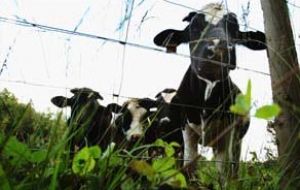MercoPress. South Atlantic News Agency
Second FAM case confirmed at another Surrey farm
 The EU has restricted all live animals, fresh meat and milk products from mainland Great Britain.
The EU has restricted all live animals, fresh meat and milk products from mainland Great Britain. A second case of foot-and-mouth has been confirmed at a farm in Surrey with up to 100 cows culled at the settlement in the 3km protection zone set up around the site of the first outbreak.
Meanwhile, Roger Pride, owner of the first herd to be culled, said in a statement he was shocked and devastated by the outbreak. "It feels as if my whole world has been turned upside down," he said. The findings of a probe into the source of the outbreak at his farm are due later. In the statement read out at a National Farmers' Union press conference, Mr Pride said he first realised his cattle were off-colour and drooling last Thursday. By the following evening, the Department for Environment, Food and Rural Affairs (Defra) had confirmed they had tested positively for foot-and-mouth, he said. He went on: "Whatever the cause of the outbreak, it is obvious that we've been the victims of circumstances far beyond our control." He said it was possible a sewer which overflowed into part of the field may have been the cause. No-one from the farm had had any contact with the Pirbright facility, which is being investigated as a possible source, he added. On Tuesday, a Defra spokesman said laboratory results showed foot-and-mouth at the second site, not far from the first infected location, Wolford farm, near Guildford. Environment Secretary Hilary Benn told BBC's Breakfast the speed with which the second outbreak was identified showed measures to control the disease were working. He said vets first spotted signs of foot-and-mouth in the animals on the farm on Monday, and a swift decision was taken to cull them. He urged farmers to continue to examine their stock. A 3km protection zone and a surveillance zone with a minimum radius of 10km is in place around the first site. An announcement is expected later on how these zones may be affected by the second case. The source of the second outbreak is unknown but virologist Professor Ian Jones said it was likely to have come from the original contamination source, not a secondary infection from Wolford farm. Farmer Laurence Matthews, who owns the land where the second outbreak struck, said the farmer whose cattle were culled, and his family, were "absolutely devastated". "We were starting to think that maybe this virus had been contained... now with this second outbreak this has set us back again," he told BBC Radio 4's Today programme. "Most farmers... are very, very scared and all activity on farms has almost come to a standstill." He said the farmers' plight had been worsened by a lack of information, the failure to close all public footpaths in the protection zone and the inability to transport carcasses from the farm to an incinerator because of a ban on movement. Mr Benn said the issue of footpath closures would be investigated immediately. A Defra spokesman said footpaths on contaminated premises had been closed off, but those within the protection zone were still open and as yet there were no plans to close them. He added that people who lived within the protection zone were allowed to move in and out of the zone as long as they observed all the biosecurity measures. NFU President Peter Kendall said the second outbreak was bad news but not completely unexpected. He said efforts were under way to improve communication with farmers. Meanwhile, the findings of the investigation into the cause of the first outbreak are also expected. The Health and Safety Executive investigation centres on two neighbouring laboratories in the village of Pirbright - about four miles from Wolford farm. The strain of the virus found on the farm was being used at both private vaccine manufacturer Merial and the government-funded Institute for Animal Health. Chief veterinary officer Debby Reynolds has said it was possible recent floods may have contributed to an accidental release of the virus from one of the labs. It is thought contaminated water may have been incorrectly disposed of down a drain which subsequently overflowed during heavy rain and carried the contaminated water on to farmland. Ms Reynolds said no decision had been made on vaccines for livestock, but 300,000 doses had been ordered from Merial. Mr Benn said: "In order to consider [vaccination] as an option, we've got to have the vaccine ready. "It's the best place we can go if we take the decision that we want to do it." Both Merial and the institute have denied any breach in biosecurity procedures, which are now being independently reviewed. The government has banned the movement of all livestock in England, Scotland and Wales, while the European Commission has formalized a ban on British exports of meat, milk products and live animals. Northern Ireland, which has imposed a ban on all cattle, sheep and pigs from Britain, has been excluded. Trading standards officers in Lincolnshire confirmed on Monday they were investigating two cases of alleged illegal movement of livestock. The NFU has estimated the outbreak could cost "tens of millions of pounds", affecting not just farmers but related industries, such as abattoirs and meat packaging plants.




Top Comments
Disclaimer & comment rulesCommenting for this story is now closed.
If you have a Facebook account, become a fan and comment on our Facebook Page!